#but that's the thing about theories... they don't always apply in the real world
Explore tagged Tumblr posts
Text
I think the thing that makes masking disability very complex is that often, masking is done to protect one's self, but you still don't know exactly how you'll be perceived by other people, and if you're safe in the ways you want to be. Something I've learned more and more is that... you often can't "fully mask" in the sense that there are certain blindspots you may miss. My flat, monotonous affect stems from autism, and while I can (and do) mask other traits, I can never mask that trait. But, the thing is that I don't detect that I am monotonous, and I only learned that because other people perceived me that way and actually told me. That's what I mean by masking only goes so far, often.
#disability#autism#for me the things that disable me are 'invisible' and in theory i could mask it#but that's the thing about theories... they don't always apply in the real world#this is not me saying that i have it worse but that i think this conversation is nuanced and can easily be different from person to person#i truly thought i DIDN'T have a monotonous voice around people i like. because i percoeved myself as more expressive...#...HOWEVER that isn't picked up on by other people#i think this is a mild example which feels a bit less personal so i'm willing to share it to Make A Point#again i'm not saying i've got the One And Only Experience Ever - just that masking is really nuanced and messy#and many people cannot mask ever and that brings its own unique challenges! and that's a conversation WORTH having too#but i leave it to people who actually have those experiences because while i follow no-masking people i still don't always Get It
47 notes
·
View notes
Text
i have come to realize over the past few days that a lot of bad transfeminist takes on this website are percolating in spaces where it's presumed the transfem experience is one of either attempting to be recognized as a woman socially, or wanting to be recognized as a woman socially but not attempting (with an unspoken "yet" attached), and suddenly everything coming out of those spaces about transmisogyny makes sense.
transmisogyny never applies to men because if you're a woman, you know it already. or if it does apply to men, it always benefits them, because someone who looks like a man and occupies the social role of man could never actually be a woman, at least until they start trying to occupy the social role of woman. if a woman is closeted, she'll come out eventually. people who don't chemically or surgically transition and continue to use he/him are selfishly benefiting from transmisogyny, and don't want to come out because they benefit too much from enacting violence on trans women. transfems are always treated as failed women, and never as failed men, because being transfem means trying to be recognized as a woman. nobody could ever see a real transfem as a man, only men are seen as men, and transfems do things like use she/her and wear women's clothes and go on estrogen, which means everyone knows they're transfem. transfems who are men aren't a part of this conversation. tma people who aren't women don't exist because transmisogyny comes from being perceived as a woman.
and it's like. well. i certainly know lots of people who would directly contest & cleanly disprove your presumptions here (i mean. myself being one of them, even though i do present femme full-time!), but you'll never get the chance to have your worldview shifted, because you've made your social spaces profoundly unfriendly to them!
even if you've already made an effort to decouple transmedicalism from your theory, you still have to make an effort to actually engage with & understand the material experiences of people who don't align with current narratives about transition at all. transfems who use all pronouns and grow massive beards while on e and never legally change their names or gender markers. transneutral and transandrogynous tma people. trans women who refer to themselves as women but do not want to chemically or surgically transition or publicly use pronouns other than he/him, ever. full-time female impersonators who solely use she/her and chemically and surgically transition, but still identify as men. and you have to really engage with what we say about transmisogyny, as in, listen in good faith and understand what we're expressing about its functions in our daily lives!
or you could circlejerk forever about how being a woman is the be-all-end-all of experiencing transmisogyny and personal identification is one and the same as material conditions of privilege, to the point that personal identification automatically prescribes material privilege. and shut out a solid chunk of tma people from your gender theory permanently and irrevocably. and implicitly call a solid chunk of tma people liars for talking about daily life experiences. that's cool too, definitely won't have any negative consequences for trans community and trans spaces in the broader world or anything.
389 notes
·
View notes
Note
Hi, I want to gain a greater understanding of communist theory but I have memory issues and a learning disability that makes reading and retaining what I've read difficult. I still try to read a lot but it often doesn't feel like it sticks well. Do you have any recommendations? Feel free to ignore this, I am not sure who to ask for advice.
Well, as someone with ADHD myself, I find that the best way to retain the things I learn is through things like study groups where we can discuss and apply what we are learning together. I recommend a collaborative approach to learning theory to everyone, but especially for someone who otherwise finds it hard to retain information, a group format where you can discuss these topics and ask questions about them is very helpful.
Everyone's memory tends to drop things that you don't actively use and recall, and this is accelerated when you have memory-related disabilities. The more you can find ways to consistently apply the things you're learning to the real world around you, the more you will remember. Theory is not something you learn through rote memorization but instead is a practice. Always ask questions, always investigate, always compare and contrast your predictions with outcomes in order to refine and improve your theoretical knowledge.
85 notes
·
View notes
Note
To those confused by how the panopticon theory can apply to dating, think about this way. As the mod explained, the theory holds that “people can be controlled when they believe themselves to be under constant surveillance even if no one is watching. The theory stems from the intended effect of having a central guard tower in a prison that all the prisoners could see, even though they could not see the guards.”
So in the context of dating, if you’re NOT aware by the social panopticon, you’re chill when dating people. It’s just about you and your partner. There’s no one watching you, whether literally or metaphorically, digitally or in real life. So there’s no performance, no anxiety about the larger context, no sense of being surveilled and judged by others, no need to prove your love to the world.
On the other hand, if you ARE aware of the social panopticon when dating, the larger context of what it means to date in the modern era is always (potentially) watching you. It’s not just you and your partner, it’s you and your partner both against the world AND in the world. But it’s also subtly you against your partner, cause what if they’re with the world? You have to test them to make sure.
Social media is a huge part of this cause it includes soft-launching and hard-launching partners, posting them the right amount of times but not too much, keeping the mystery or revealing more. It’s things like National Boyfriend Day or subtle boyfriend tests on TikTok. Even just being in a queer relationship can come with its own panopticon, its own rituals of surveillance and performance. Everything is the relationship as product, the relationship as lifestyle brand.
To use well-known celebrity examples, Taylor Swift who knows she can’t escape the social panopticon with dating so she leans into it. Chappell Roan is someone who is very aware of it and scared of it. And Sabrina Carpenter’s song “Please Please Please,” where she sings, “ Please please please don't prove I'm right/Please please please/Don't bring me to tears when I just did my makeup so nice/Heartbreak is one thing/My egos another/I beg you don't embarass me/Mother fucker ahhh” is a perfect example of this phenomenon too.
Most of us aren’t celebrities, but the basic principles remain no matter the scale. But some people seem to have the freedom to truly not be influenced by it.
Oooh, when Googling it, I just found this article which I think captures the concept well: https://helenaaeberli.substack.com/p/dating-in-the-digital-panopticon
FYI
58 notes
·
View notes
Text
I wanna theorise the Ghost Gang's ages
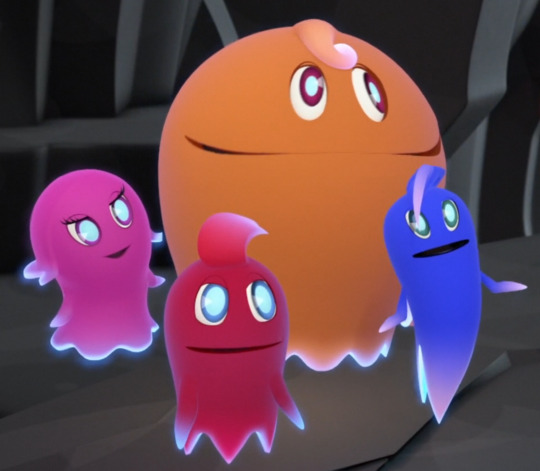
I think it's widely accepted that the Ghost Gang are believed to be kids, or at least the same age as the Pac trio. Their exact ages are never mentioned of course, but it has never really been brought into questioning either.
It's often a point of interest when fans talk about the Pacworld Wars or the Repository - either that Betrayus was cruel enough to enrol children to fight in his army, or that Stratos/The Freedom Fighters were cruel for supposedly allowing children to be sent to the Nether.
I've thought about this a few times, also as someone who saw the Ghost Gang as teens, but recently I've looked a bit more closely at the semantics of it all, and it's led me to this one big question:
Why are we assuming that the Ghost Gang ARE children?
Don't get me wrong, we have good reasons to believe they are.
They sound young
They often display childish or immature behaviour
They're familiar enough with the Pac trio to get along in ways that teenage friends would
Pinky has a crush on Pac, so we assume that they are both at least the same age...unless Pinky is a closet cougar.
But when you think about it, these traits can sometimes carry over into adulthood and do not always indicate child-like or teenage behaviour.
I've thought more on the matter, and I've come to realise that we also have a few reasons to believe that the Ghost Gang are in fact adults, or at least young adults.
Blinky is a Pac-Fu Master. The art of Pac-Fu is considered a powerful form of martial arts, supposedly more powerful than Kung Fu, and thus would take years to master. I highly doubt that a child would be able to reach Pac-Fu Mastery before becoming an adult, unless its a child prodigy. I think its safe to assume that Blinky spent several years mastering the art in order for him to reach Master level, so it makes more sense for him to be an adult. A young adult, at the very least.
Clyde speaks 9 languages. For a person to learn new languages, they have to reach an age of proficient academic understanding and dedicate some years to be able to speak multiple languages. According to google, it takes 2-3 years to become fluent in a new language. Multiply that with Clyde's languages, and he must be at least 27 years old. A loophole to this theory would be if Clyde learned all of his new languages in the Netherworld after he became a ghost.
Perhaps a gray area, but Pinky did allude to having a very busy social life. This could mean many things; either she's a teen who just likes to socialise or she's a young adult that likes to socialise. Leaning a bit more towards the latter, it could be that she's independent/old enough to make her own choices regarding dating and maintaining her busy social life (even though she spends most of her time with the boys).
A bit of a messy point, but it doesn't make a lot of sense for the Freedom Fighters to deliberately allow children to be turned into ghosts. These guys fought for freedom against Betrayus' war and tyranny, and good people like Zac, Sunny, Sir C, Spheria, etc were all part of the side that fought against Betrayus. Compare the Freedom Fighters with Betrayus and his army, and it's more likely that the Freedom Fighters would've opposed sending children to the Nether. So how did the Ghost Gang end up bodystripped? Probably because they weren't children, but were old enough to join Betrayus' army and thus face the consequences of such a choice. This makes it all the more likely that the Ghost Gang are young adults, between the ages of 18-30.
In the real world, some countries allow citizens to become part of the army as early as the age of 16. If we apply this to Pacworld, then we can stretch the perimeters a bit and speculate that the Ghost Gang are between the ages of 16-30. It would definitely make more sense in Inky and Pinky's case, who seem to act the youngest/least mature out of the four.
The Pacworld Wars and the politics surrounding who got bodystripped, and the bodystripping/soul-extraction matter itself, is quite the can of worms. For me, knowing all that we know, it would make more sense for the Ghost Gang to be young adults. They would be within the age of enforced enrollment in Betrayus' military, and that subsequently puts them in the same category of soldiers to be bodystripped.
What do you guys think? Am I reaching too far with this theory? xD
With all that being said, here is a ROUGH estimate on how I hc the Ghost Gang's ages to be, slightly tweaked from my previous guesses:
Blinky - 23
Pinky - 16
Inky - 18
Clyde - 27
Again, this is just a theory! If the Ghost Gang are legit teens, then they're teens I guess. This is just me trying to plug in the holes in the story for why children were fighting in the war in the first place - and send to the Nether in the first place.
#pmatga#pacman and the ghostly adventures#pmatga headcanon#ghost gang#pinky#inky#blinky#clyde#inky pinky blinky clyde#betrayus
105 notes
·
View notes
Note
your post from a few days ago about the defeatist logic of antisemitism raises another point:
as you said jews are a concrete target. i would also add that we are the easiest target. there's only .2% of us and we are seen as inherently alien by everyone (most ppl have never met a jew so we're sooo unrelatable and mysterious to them) which leads to antisemitism being ignored/labelled unimportant.
because antisemitism is seen as unimportant and gets easily dismissed this leads to an interlocking of all other bigotries with antisemitism being the odd one out. leftists can care about racism because it's something everyone faces and the same applies for homophobia (which is seen as universal), islamophobia (there are hundreds of millions of muslims and it's viewed as a form of racism) and the list goes on. but antisemitism is labelled and viewed as a jew only problem. so why must anyone else care? its the easiest thing in the world not to. for the longest time i saw non jews pair antisemitism with every other form of bigotry as if trying to make it relatable so people can view it as a real problem.
these are really important and good points. as you said, the problem of "antisemitism always needs a chaperone" is both that antisemitism is not treated as important as there are so few jews and it's treated as trodden ground. "not important" if it's on it's own, but also that antisemitic attitudes never travel alone either. it's always the structural underpinnings of violent extremism and the hatred of any other group and it needs to be addressed as THE issue behind the escalation to violence. jews are seen as both an easy target but also a worthy (aka powerful) one that makes an extremist look like they are going up against something much bigger than they are.
that jews are rich and powerful is also widely accepted as true even by centrists.
the end of discussion, dissent, and figuring out how to improve obvious problems in society, and the beginning of random mass violence is antisemitism. people need to recognize that it's where the violence is coming from. you don't need jews around to have antisemitism. not only that, but you don't need to be jewish to catch a bullet because of antisemitic theories that say violence is the only way to defeat (((the jew))) as imagined in antisemitic conspiracy theory.
look into any mass shooting, terrorist attack: black, white, brown, blue, red, purple, green... you will find antisemitism tying it all together and demanding blood, soil, and death.
37 notes
·
View notes
Text
Umineko Episode 5 Theory Crafting
This episode has more or less been an exploration of HOW to solve the mystery, and while I really appreciate all the help Ryukishi is giving me it doesn't make sense to repeat the actual text of the story and call it a theory, so I'll just be combining all my theories about the wider mystery for this one, in no particular order:
Battler's sin is making a promise / confession to Shannon and then bailing for the next six years. She's heartbroken by him, and that directly or indirectly led to the massacre. Normally I wouldn't suggest mass murder over a lame man, but considering Battler's rejection had her getting together with George I think I can make an exception. She's justified
Speaking of Shannon, I think she's the culprit for all the unsolvable murders, or at least involved with them somehow. "But she was confirmed dead!!" True but that was only as Shannon, I can see her using "Sayo" as a loophole. Shannon can die metaphorically speaking and Sayo can still be kicking it and shooting people, as she deserves. This also could apply to Kanon, especially regarding the second twilight in Episode 2
I have a feeling Rosa is involved in at least some of the Episode 2 deaths and Eva I'm pretty sure is confirmed to have played a part in the Episode 3 ones, but Natsuhi isn't a culprit in Episode 1. I have no proof but I love her. Overall, I think Shannon takes more of a "mastermind" role, since just about everyone else can be bribed into being a culprit or accomplice
Bc of the above, I think both Battler and Beatrice are right-- since the witches / furniture seem to be a magical extrapolation of things in the real world (Chiester sisters are the forest animal band, Virgilia is Kumasawa, Ronove is Genji, etc) I think Beatrice is Shannon's magical counterpart. Beatrice IS the culprit like she's been claiming, since Beatrice is a proxy for Shannon, but technically there's always been a human culprit
The "accident" that wiped out the family mentioned in Episode 3 is an earthquake. I don't have proof I just can't think of anything else and the irony would be really funny. I have a feeling Battler's fear of falling is related to this part of the narrative but I don't know how
The seven stakes are supposed to represent guns. The reason they got driven so deep is bc the deaths were never stabbing, just guns. bang bang.
There's smth fishy about the whole Missing Child (tm) thing from Episode 5. The idea that Kinzo just. Gave her a child? without Krauss there??? and then covered the whole thing up before he got back???????? It's giving a lot of He Would Not Fucking Say That and I don't think that's exactly what happened. I do think Natsuhi committed infanticide though. sorry bestie
Magic isn't "real" in the traditional sense but I do think there's gonna be a moral about how alternate truths and white lies are their own kind of magic and it's wrong to destroy that
Erika is going to have a full blown breakdown in Chapter 6 and I cannot WAIT
Ok that's all I can think of rn, might add stuff to this later!
25 notes
·
View notes
Note
I was thinking about the old LN1 character bios and remembered the line about the Twins being "born to be chefs". Assuming their not native to Nowhere, this would mean they had some violent tendencies before becoming residents, like it was their destiny.
This then made think about the end of tson ep 3 where Otto says the something like "Our world isn't the only world, let alone the predominant one".
All this made me realize that the worlds other than Nowhere may have been created by it (The Nowhere is implied to be sentient in it's own right) specifically to create concepts and injustices that could be used to warp and traumatize children, turning them into visitors and then into residents.
Thoughts?
Alright so this is a great question that I think leads to a much larger discussion about how the Nowhere operates. I would like to hear what other peeps think as well.
So, starting from the Chefs. Personally I always assumed that they are part of that group of characters who are from the Nowhere because of the way their description is worded (and also their baby pictures... this one is so cute lowkey...)

--- But following your train of thought: considering what we know of the Nowhere, it seems to amplify certain characteristics of a person, usually the bad ones. Two kids who are a bit propense to get into fights in the waking world may very well become blood thirsty maniacs in the Nowhere.
Interestingly, the modification of traits does not only apply to personality but also the body -- and usually, the physical changes are in relation back to said traits. For example, the Teacher - someone who is known to be controlling - can extend her neck infinitely to look everywhere and have the ability to blink removed to make sure she's always watching. The Doctor, a perfectionist with tons of authority, is always looking down on people while also growing enormous to match his ego. So on and so forth, you can follow this reasoning for a large number of the Residents we meet.
I think other timelines derivating from the Nowhere is definitely a possibility, as we don't know much of how the universes work there.
The general theory of a multiverse irl is that no timeline has any specific weight or importance over others; they are all parallel no matter how different, with no timeline being "the real one". This is if we view the Nowhere under the lens of it being a separate dimension. In TSON, the Nowhere is kind of implied to be sucking the people most vulnerable to it right in, so perhaps the idea Otto has of it the predominant world stems from the fact that he can't explain his fascination with it... or from a real, genuine desire to somehow "return" to the original land, if that's where the other timelines originated from.
HOWEVER, I would like to offer an alternative perspective on this --- based on what I found out during my research on the Ladies. Yup we're going there again
Rather than the characters themselves, this time I'm going to refer to a symbolism that is very prominent in their lore: Buddhism. More specifically the references to the six planes of existance, and how those can be tied back to Little Nights in a loose way. As stated in this site:
" The six realms of rebirth are a schema in which beings are reborn according to the kind of life they lived. [...] The animal realm, in which inhabitants are driven by basic needs, is one of the three “lower” realms. The other two are the hell realm, a place of constant suffering and torment, and the realm of the hungry ghosts, grasping beings who are never satisfied. The three “higher” realms are the human realm [...] the demigod realm [...] and the god realm, where beings enjoy a life of pleasure. It’s important to note that some Buddhists view the realms as literally real, while others interpret them psychologically as metaphors for the emotional states of the human condition. "
(Click on the link to read the whole thing; I only highlighted the parts I think are relevant to this conversation :] )
What I believe specifically relates back to the Nowhere are the three lower realms, from which the place itself may be loosely inspired by because of how its inhabitants are described.
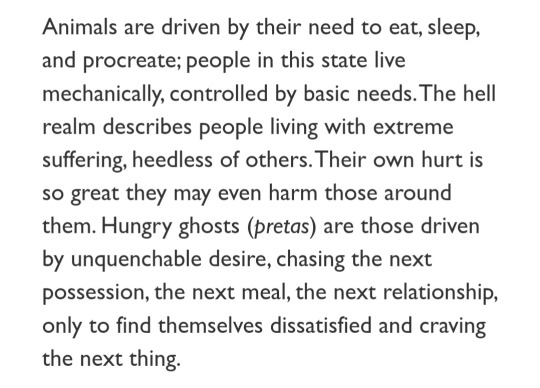
All of these are things we see in Little Nights from various Residents, depending on the social class and place. It is important to note that while these realms are placed in different hierarchies due to quality of life, they all cohexist together without necessarily being more important than each other as they all have the same purpose in the end.
If the worlds of Little Nights operate in a similar way, then what we're looking at is not really a case of dimension hopping, but rather a passage from a plane of existance to the next. A forced one at that, at least in the case of Noone.
Now, considering Otto's assumption, the idea of the Nowhere being a predominant realm only popped up because he was trying to wrap his head around it and how Noone felt, but to tell you the truth, it is a rather baseless assumption considering he's never been there and is only experiencing it in a very limited way. However... considering how many children from different places in time and space have experienced the Nowhere, sometimes even simultaneously, I wouldn't say that it's completely wrong to assume that the place might be the "original plane of existance".
Now. Reflecting on what you said at the very end, I would like to ask a question back: do you think the Nowhere is, hypothetically, only capable of bringing out the worst in people inherently? Or is it only acting this way because humanity itself is more easily conditioned to fall victim to their bad traits?
I've been recently thinking about it because of the Maw. The writer of Little Nightmares, Mr. Mervik, has stated multiple times over the years that the place has not always been the way that it is; at the same time, he also said that it was not man made, but rather created by collective hunger/desire to be fed. These two things don't make sense together unless you assume the Maw was not originally born for the Guests and the whole cannibal business, but rather from a desire of shelter. A need to be fed. Which is not inherently a bad thing -- and it would explain why the structure itself is so largely built to house so many people, and why children still feel relatively safe in it to this day.
So I find myself thinking that perhaps, the Maw degenerated overtime because the people inside of it (cough its leaders cough) did. And if this is the case for the Maw, who's to say it's not the same for other places? The Nest, for example? The School, the Hospital... etc. But. It is also true that the creatures who inhabit the Nowhere (the Ferryman, the North Wind, the Flesh...) all seem to have their own interests and destructive amusement more at heart than anything. If these creatures are what move the large of the Nowhere (which I guess they are considering the eye symbol is all over the goddman place), then the human will can't really do much.
That being said, I am wondering currently if it could be possible for the Nowhere to bring out something good from a person in the right situation. At the same time, the hopes are incredibly slim. Nonexistent, actually, but it's nice to think about hypothetics.
#little nightmares#little nightmares 2#little nightmares 3#little nightmares theory#ln theory#ln meta#little nightmares 2 theory#tson#the sounds of nightmares#tson meta#the chefs#little nightmares the chefs#six#six little nightmares#the lady#the lady little nightmares#(relates back to the maw ig)#{damn viewing the nowhere under these lens makes fox a lot more tragic now that i think abt it#because im assuming the maw has primarely spawned from *her* desire to find a place for her & her children to live in safely... oh#its such a childish thing in retrospect... wishing on a star and then your wish GETS GRANTED in the most FUCKED UP WAY IMAGINABLE#my girl did not get 《bite of 83》ed for this#plus according to context clues (aka my insanity) i dont think fox has ever been on the maw... like. alive#so its even twice as tragic because she never really got to try. like she could have done something good but the chance was ripped from her#im emo in the club again}
72 notes
·
View notes
Text
Good morning, happy Thursday, who wants to read a fun idea I had about giants in Soul Society?
So! I was reading this @littleeyesofpallas post about wuxing symbolism and was particularly struck by this passage in a section about the gate guardians:
There is no central guard but conspicuously Kirinji's name comes from Qilin, but apparently according to official height he's actually not nearly as tall as Kubo's drawings always made him seem. Not that he was on the same scale as the gate guardians even then...
No, I said to myself, of course not. He's powerful enough to control his size, because I was thinking of the part where Grand Fisher claims Isshin is too small to defeat him and Isshin responds with a lecture on soul reaper lore:

Now, bodies are not swords, but maybe the same mechanic applies! It certainly applies to Hollows. Earlier in this same scene, Kon mistakes Grand Fisher for a Menos Grande, and Grand Fisher is insulted by the comparison, but it's the same thing. Menos are huge and scary, but when they become Arrancar, they shrink down and become scarier. [Aside: I think this is why the Yammy-is-secretly-Espada-0 reveal doesn't quite manage to hit. It goes against the lore Kubo has been laying down for ages]
On a meta level, this is just a shounen storytelling tactic where X is an indicator of strength, but then later on, it's like "Reverse Uno! Not-X is the real indicator of strength!!" That's exactly how this zanpakutou-size thing is used when it's first introduced.
Exhibit A: Renji, a court jester, being impressed by the size of Ichigo's sword:
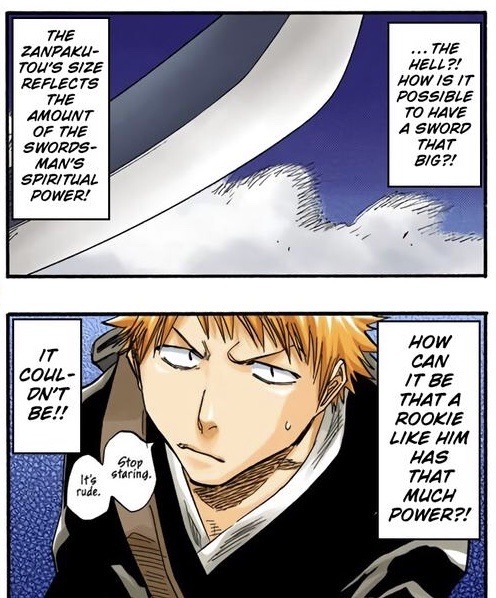
Exhibit B: A handful of issues later, Urahara, an intellectual (lol), sets us straight:
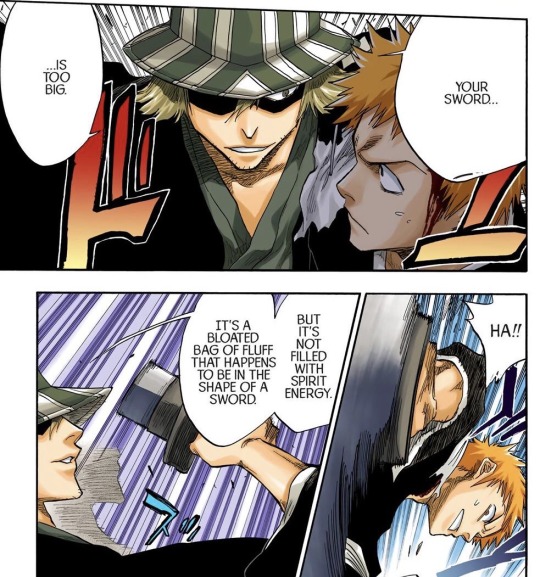
Genre convention or not, I think it lends itself some interesting world-building. Among low-powered people, size is impressive, but as you scale the ranks of power, it's kind of pathetic. Weirdly large people are like the petty bourgeoisie of Soul Society power dynamics.
But that's actually the perfect niche for a gatekeeper! In general, your typical Joe Shinigami is going to be able to take on just about any rando from the Rukongai, but maybe not a particularly strong ryouka. Ganju was able to take on Yumichika, after all. A single shinigami wouldn't be able to take on a planned rebellion, like in the Bount arc, and they've got to, like, sleep and stuff. The Gotei could, in theory, have an entire gatehouse and a gate patrol, etc, but that they are perpetually short-staffed as-is. Instead, how about one medium-powerful gatekeeper whose size makes them well-suited for fighting groups of people (or siege weapons), and who is going to be intimidating overall?
Furthermore, it's implied that Jidanbou isn't actually a shinigami. He wears a shihakushou, but his axes don't seem to be a zanpakutou (he doesn't release them and is distressed when they are destroyed). His neighbors offer this comment on him:
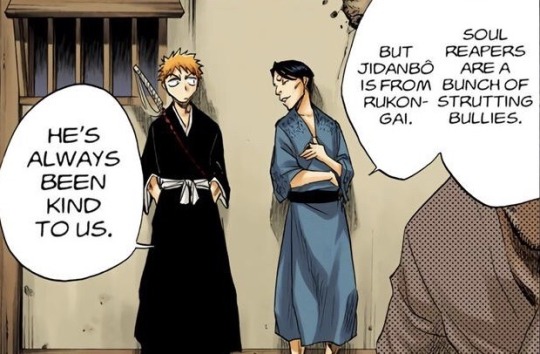
It's not quite right, though: after all, many shinigami are from Rukongai, including Gin, who is the reason Jidanbou is being healed at the very moment this panel takes place. I think what this guy means is that Jidanbou is of Rukongai, which is to say not of the Seireitei.
So what is he, then? Here's my big idea: I think that the gigantism in Soul Society might actually be a reiatsu-developmental disability! It's always been my impression that growth, especially for powerful people, happens in fits and spurts, rather than linearly, and that furthermore, big changes in growth tend to coincide with developments in reiryouku. Somewhere, either in childhood or adolescence, someone's spiritual pressure grows more quickly than their control over it, which results in their body growing uncontrollably. They become very powerful "physically", but their strength is all in their mass/reishi, which takes most of their spiritual pressure to control. This may end up limiting the upper end of power they are able to achieve and some cases means they get cut off entirely from the other forms of power used by shinigami (connecting to a zanpakutou, kidou). I think this might be especially common in children from the Rukongai, who lack access to education and training. I can also imagine it leading itself to cautionary tales in the outer Rukon that if you feed your hungry children too much, you'll end up with a giant on your hands.
This offers one explanation to why Jidanbou is a giant and his brother Jiroubou is large, but not remotely on the same scale (the Souls Data Book lists his height at 7'7" vs Jidanbou's 32'5"). There are a handful of other shinigami of larger-than-human height, which could be a milder form of this, or it could mean that some sort of special training or medical intervention helped keep their growth manageable. I think you can squeeze in a lot of interesting character insights into this headcanon, from Hachi (8'5"), who perhaps worked exceptionally hard in an effort to control his power and ended becoming incredibly skilled at kidou as a result (interesting that he, too, is not actually a shinigami). Or Oomaeda (6'11"), who gets by a lot on his family's wealth and clout, but is definitely on the weaker end of the lieutenant power scale. In his case, his large size kind of speaks to his entire "thinks he's classy, but is really just gaudy"/can't-even-tell-how-outclassed-he-is-by-his-peers deal.
Then, as a counterpoint, you've got Hitsugaya: immensely powerful from a young age, and one of the hallmarks of his character is how in-control of himself he is, down to having developed an actual visible power bar for his bankai. Whether this is some effect of his personality, or whether it's an intervention on Hyourinmaru's part, his growth has been choked off as a side effect. He's the direct opposite of Jidanbou, who additionally seems somewhat childlike in personality (crying over his axes, for example, or his attachment to his extremely dubious "rules of the city"). To me, it's very sweet that their friendship might have roots in opposite expressions of the same reiatsu-growth-fuckup.
Much in the way that the Shiba use some sort of magic that's distinctly different from shinigami-kidou, I guess I really like thinking about other ways power might manifest itself in Soul Society outside of the shinigami-industrial-complex. And also the way the Seireitei may or may not try to control those powers."Guard this gate!" they say. "We won't actually let you live in the city or give you city wages, but you can have a cool outfit and, uh...do it for the exposure?"
#soul society worldbuilding#gate guardians#jidanbou ikkanzaka#soul society inventing new forms of ableism that are only accessible at the highest level of power. incredibly on-brand for them#toshiro hitsugaya#hachigen ushoda#marechiyo omaeda#this may or may not be relevant to zaraki (6'8") but that guy is in his own category#werewolves are also their own thing but i wonder if their size firmly predisposes them towards the 'melee' side of things#not sure we ever saw komamura do a kidou and his hex chart rating was p low#ngl even tho it's a little silly later on i LOVE it when the characters in early bleach have no idea how the worldbuilding even works#rukia-doesn't-know-what-a-quincy-is i am looking at you#like it's not graceful or anything but learning how the world works is a thing that goes along with character and power growth#it underscores how 'young' characters like rukia and renji are even though they are old by human standards#and also how soul society is not. uh. committed to the ideals of the free spread of knowledge and education#i just think it's neat! my favorite lil dystopian afterlife!!#the reason i read that wuxing post is bc i woke up this morning and missed troius and went to go scroll thru his blog and it was there#troius i miss youuuuuuuuuuuuuu i hope you're having a great day
18 notes
·
View notes
Text
So @doyou000me sent me an ask about the film making of Love for Love's Sake (which I have learned is based on a novel and now I'm very interested in reading it lol) so having watched the currently available episodes the big thing I noticed was the shows use of Aspect Ratio.
"In simple terms, the aspect ratio of a movie is how wide the frame of the movie is versus how tall it is, usually expressed as a ratio. For example, most TVs and computer monitors are 1.77:1 (more often expressed on consumer packaging as 16:9), which means the screen itself is 1.77 times as wide as it is tall. The higher the first number in this ratio is, the wider the screen will be." (source)
I know, nerd math.
Basically you know those black bars you sometimes see on the top and bottom of the screen when watching a film or tv show? That's a director filming in a specific aspect ratio:
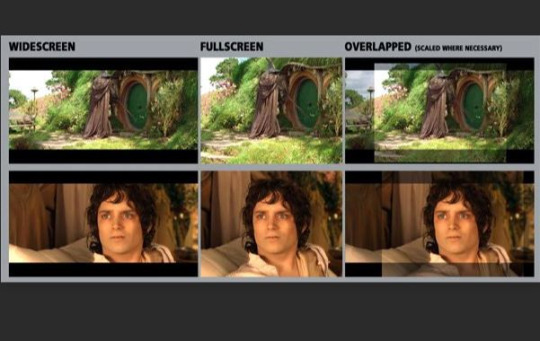
(source)
Film makers use aspect ratios in a ton of ways, there's a lot of examples out there from Hateful Eight (Quentin Tarantino), and Dark Knight (Christopher Nolan) where the former used aspect ratio to invoke the film making style of old westerns, while Nolan used a taller aspect ratio for fight/action scenes to give the scene more physical impact.
A recent example that I've seen that I think applies really well to Love for Love's Sake is Marry My Husband:

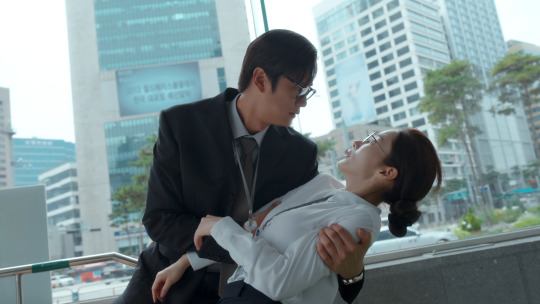
See how the first scene has black bars above and below? The director is using a different aspect ratio than in the second shot (these are both taken from ep01). What does this signify in the story?
Flashbacks. Flashbacks in Marry My Husband are always filmed in a different aspect ratio than scenes in the "present" storyline of the show. Perfect Marriage Revenge also uses aspect ratios this way.
Love for Love's Sake does something similar but instead of flashbacks it uses aspect ratio to denote between "worlds".
The game world is filmed in a longer aspect ratio than the "real" world which is filed in a different ratio (not a standard full screen but it does have a taller ratio than the game world):

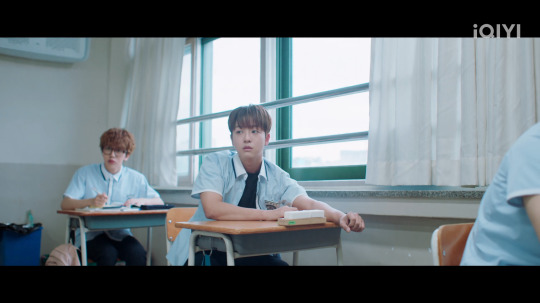
This, so far, has been consistent in the four episodes that are out. We have another return to the "real" world in I believe ep03 and we see this same aspect ratio dynamic.
Another thing I noticed is the "real" world's color saturation is much higher and warmer than the "game" world, but it's also (ironically) much more enclosed - this could honestly be a story choice or a budget issue - and boxed in. Something I don't see discussed a lot in terms of cinematography in BL is the use of Lines and Shapes in film and how they add to the composition of a shot.
I really like this video on the subject though it focuses mostly on animation it's still relevant:
youtube
Now if you look at the "real" world scene in Love for Love's Sake we see that the protagonist, before we even know who he is, or anything about him, is in a highly saturated room, warmly lit, but also boxed in:
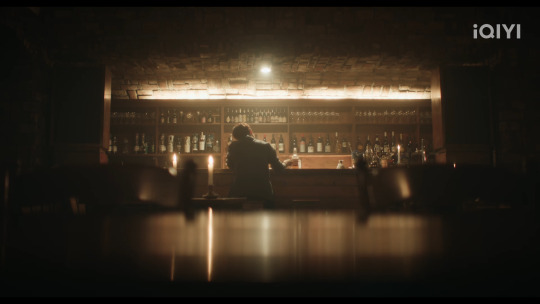
The warmer saturation denotes a sense of intimacy, which makes sense in a bar setting, but the boxed in frame around him gives us a sense of tightness, tension even, maybe a sense that he feels trapped. We later learn through dialogue he's unhappy with his life and unhappy with the way the novel story he read has played out.
Then, when the scene transitions into the "game" world, the protagonist is in a different aspect ratio, the color grading is now more desaturated and has a higher blue hue to it, the character is also in an open space and filmed front forward facing instead of from behind:
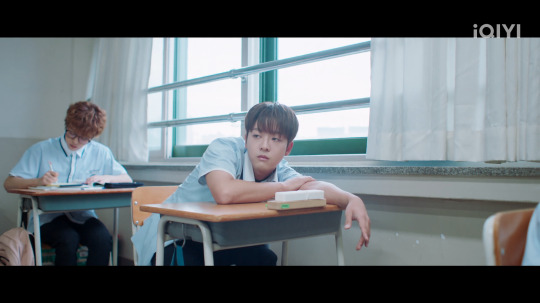
This all works well because the audience knows, even before the character does, they are in another "world" and its very different from their own. It creates to specific aesthetics which help set the worlds apart from one another.
For more on color theory, this is one of my favorite videos on the topic which has more to do with like, hue and saturation rather than "the blue curtains mean xyz" which is a singular and narrative heavy way to focus on color theory instead of how color adds to the tone, emotion, and world building of a piece of media.
youtube
I think the first episode of Love for Love's Sake is the best filmed of the episodes so far, the budget starts to chip away in other episodes but I do want to give them their roses b/c they do work within their budget well. There's a lot of interesting visuals used especially with the game pop ups that I really like, and some nice camera work. The editing is a bit weak at times but there's been some good choices too.
I also really liked the scene with Yeo Woon running and how his feet lit up and how that aligned with his affection points going up. The editing for that was well done.
So yeah, those are my film making thoughts on the show for now lol
Check out other posts in the series:
Film Making? In My BL? - The Sign ep01 Edition | Aspect Ratio in Love for Love's Sake | Cinematography in My BL - Our Skyy2 vs kinnporsche, 2gether vs semantic error, 1000 Stars vs The Sign | How The Sign Uses CGI
[like these posts? drop me a couple pennies on ko-fi]
#love for love's sake#kbl#chaos pikachu speaks#spot my kofi some coins if y'all like these posts lmao#also love for loves sake is cute as hell I'm into it#its a bit slow but last episode picked up and it's very charming#chaos pikachu metas#also if you wanna have a fun time watch any video on transformers the last knight and learn how to NOT use aspect ratios lmao#god that was such a frustrating thing to witness#Youtube#pikachu's bl film series
70 notes
·
View notes
Text

☽ Welcome to the Temple of Vengeance! Greatest of the Great Gods, Khonshu, presiding. ☾
☽ Inbox: Open ☾
[Indie RP/Ask blog for Khonshu from the MCU's Moon Knight. Set after the show ends by default, but also open to other verses. Open for questions or threads! More info on the blog, or under the cut for mobile users.]
Updated: 11/03/24
Laws of the Temple
☽ BASICS ☾
- MUN STUFF: My name's Kew! She/they, well over 21. No triggers. I don't have DID, any attempt to portray it is based on the show/comics.
- MINORS BE WARNED: I'm not going to be super strict about weeding out minors since I don't expect things to get NSFW around here, but the show Khonshu is from does explore some darker themes for a TV-14 show. I dunno. You've been warned.
- GENERAL RP ETIQUETTE APPLIES: Don't make actions for my character without asking, don't assume past relationships/deep history without asking, don't read my character's mind (unless your character is a telepath, and even then I don't know if that works on gods), etc. - GENERAL CONTENT WARNING FOR: Descriptions of violence, religious stuff, swearing, emotional manipulation, a.bleism (especially surrounding mental health stuff.) I’ll try to tag other things as they come up. - FEEL FREE TO REBLOG MEMES FROM ME. It actually helps me remember to send stuff out. You can also reblog art/headcanons, pretty much anything except RP threads if you're not the other party!
- NOT PRIVATE, BUT SELECTIVE: I sometimes don't follow big multimuses back since I have pretty strict tastes in fandoms, and I don't want to clog my dash with characters I don't know. That doesn't mean I don't want to roleplay with you though! As for selectivity, I reserve the right to say no if things just don't click writing-wise.
- SPOILERS FOR MOON KNIGHT EVERYWHERE. There will be untagged spoilers for both the comics and especially the show. I highly recommend watching the Moon Knight TV show if you haven’t seen it! It got me into comic books and made me interested in the MCU. - That said, I haven’t seen all of the content in the MCU, not even a third of it, so I’m sorry if I get any lore details wrong.
- KHONSHU IS AN ASSHOLE. Nothing he says reflects my real views about anything. If he’s mean to you, it doesn’t mean I don’t like you or you’ve done something wrong.
- FOR OTHER MARC/STEVEN/JAKE MUSES: By default, I'll play Khonshu like he's connected to your Marc/Steven/Jake. If you want it to be dimension-hopping shenanigans (which I'm super down to do, especially for ones more heavily based on the comics) you'll have to let me know! All these interactions will be on different verses, and I don't plan to have Khonshu be 'mains' with any muses.
- FIGHTS: With extremely rare exceptions, I'm just gonna say no to fight threads. Partly because Khonshu is incorporeal and really can't be hurt or hurt anyone else directly. Mostly because fighting other muses has always stressed me out. If it's something you really want to do, we can talk about it. (This doesn't mean your character can't attack Khonshu ever, it just means it probably won't work.)
☽ MUSE INFO ☾

NAME: Khonshu OTHER NAMES: Chons, Bloody pigeon, Silly old bird (He accepts none of those) PRONOUNS: He/him HEIGHT: Varies, usually around 8-10 feet tall. WEIGHT: N/A (Incorporeal, like a ghost) AGE: Has existed since the dawn of time, so who knows.
- KHONSHU is the Egyptian god of the moon, vengeance, healing and time, among other smaller things. While he is enormously powerful in theory, he’s mostly unable to affect the physical world without use of a mortal AVATAR, dubbed his MOON KNIGHT. Those who agree to be his Avatar are granted superpowers and near-invulnerability, in exchange for agreeing to carry out his mission: Bringing vengeance against those who harm his travelers of the night.
- Khonshu is also somehow a billions-year-old grumpy baby who flips over trash cans when he doesn’t get his way.
- By default, Khonshu's current Avatar is JAKE LOCKLEY, and only Jake Lockley. But, he can also be played before the events of the show, when he (technically) has the triple threat of Jake Lockley, MARC SPECTOR, and STEVEN GRANT.
- Jake will make occasional cameos on this blog, but I wouldn't call this a dual muse. (You can request him in asks if you want.)
- Normally, only his Avatar (or Avatars of other gods) are capable of seeing/hearing Khonshu, but let’s say this blog is a holy space where he can answer your prayers questions. (In threads, we can always BS a reason your character can see Khonshu.)
- This Khonshu is HEAVILY BASED ON THE TV SHOW, which means he lacks a lot of the harsher history his comic book counterpart has. That said, as a god, he is aware of the multiverse and has at least a rough idea of what his counterparts are up to. You can ask about comic stuff, he just might have a different opinion.
- Some comic lore has been added/built upon, namely his fraught history with his father, AMON-RA. (This probably won’t come up much, but it does inform a lot of how I play the character.)
#moon knight rp#mcu rp#moon knight#In Character#OOC#Verse: Pre-Series#Answered Asks#About: Jake Lockley#About: Marc Spector#About: Steven Grant#About: Layla El-Faouly#About: Ennead#About: Self#About: Arthur Harrow#I'm realizing that my taglist will cause this post to appear in all the character tags so I'm sorry about that
13 notes
·
View notes
Note
I was wondering, what's your interpretation of tTPD as a whole?. I know a lot of people think it's a 31 album dedicated to one main muse minus 2 songs for his ex long term relationship but i was curious about your thoughts.
Also, some theorists are talking about a potential 10 years situationship between taylor and one muse and it makes me feel... weird. Because she was committed to someone else and i don't know how to feel knowing the other muse could be in some of my fave albums... sorry for the long rant
So there’s a lot going on here and it’s nuanced.
I don’t think it’s as simple as “it’s all about one person minus two songs.” There are several muses woven in both the text and subtext of the songs. And what happened with one muse in many cases was only possible because what happened with another. There are some songs that are explicitly about specific people’s actions, but overall things get muddy because situations are muddy.
This is a cop out answer, but ultimately to me the album is about Taylor. It’s about her pain and grief and trauma and also healing and recovery and joy. To reduce it to a man in particular discounts that she is the main character of her own life and story.
I do not think the story she put down in TTPD is one of a decade long situationship. As I said yesterday, I will gladly change my mind if new information comes to light. The story I picked up in TTPD is one where someone entered her life at a very vulnerable time, exploited their shared history to sow the seeds of this fantasy life to her that she was desperately grieving in her very real current life, which caused her to play revisionist history with her memories because she needed to make it “real” to herself as an escape hatch.
But even if that isn’t the case, and if it turns out that yes, she was pining for this person for ten years… it doesn’t take away from the fact that her past music is excellent, regardless of the inspiration. IMO fans would be better served to not always recall the muses when listening to music for their enjoyment. I know Taylor’s music is different because her life is so well documented and she used to be so open about who she was writing about, but very few artists do that and their music still hits. I don’t think at all about the artists’ lives when listening to any other band; hell, even in well-known messy situations like Fleetwood Mac, I’m not thinking about Stevie and Mick, I’m thinking that Landslide is beautiful and Rhiannon is a banger or whatever. If you think too much about the artists’ personal lives, you’re gonna get twisted in knots and may find there are few people you can listen to, because humans are fallible and messy and make mistakes. Like Taylor says, once the songs are out in the world, they’re not hers anymore, and you need to ascribe your own meaning to them.
Which is not to say I wasn’t surprised when I first figured out who she was writing about when I listened to TTPD, and yes the first few listens of the album made my head spin a bit for the lore of it all, but i truly listen to it like any other album now. It’s good music plain and simple.
What I’m trying to say is that you have to set your own boundaries I guess. If it really bothers you then you don’t have to listen to or engage with it. But personally I’m also not going to moralize Taylor’s or anyone else’s music because she’s human just like any of us and we all make choices in our lives. She was just brave enough to share the mess. It’s not a condoning of her actions because she doesn’t need my or anyone else’s approval for her choices. She’s recording a moment of time in her life and turned it into art, and now it takes on new meaning for listeners.
(Also if people are moralizing her choices because of the “commitment” thing well… I think they weren’t picking up on other parts of the album but. Well.)
Also my pet peeve is that I hate the word “theory” when applied to real people. They’re humans with lives, not characters in a TV show. This isn’t directed at you anon, just a general sentiment.
#pouring my heart out to anon but i didn’t pour the whiskey#once again TTPD is complex and the real heart of the story I think gets lost in all the gossip of it#people who pick up on it feel it deeply and viscerally#the thirtysomething album etc#the tortured poets department#i'm not getting into it on main but imo it's very obvious what was driving everything and why things happened the way they did#the moralizing of art in recent years is such a strange phenomenon#i don't know if it's because of the dreaded clock app or whatever
16 notes
·
View notes
Note
Hi there! I am about midway through reading your story Lost Vocabularies and it is amazing!! The whole series has been so lovely, I’m obsessed with the way you write! The way that you convey the boys complicated emotions and capture all the little nuances of their dynamic has me feral!! Beyond even them the way you inject so much personality into the locations is so good, I feel like I am there!! So thank you for writing this lovely story 💕 I was wondering if you happen to have a list of all the books that Bucky and Steve read? I have been looking up a lot of them and adding them to my to read list bc they sound so interesting lol! On that same note, how did you decide what books to mention? Are they all ones that you have read or did you do research to find ones you thought they would like?
I’ve been coming back and rereading this kind and wonderful comment in my inbox over the last few weeks when way too many massive, stressful, time-sensitive things were all happening at once. 💕 But since I have a little breather between crazy periods, I get to dive in here as a treat.
Lost Vocabularies involved a lot of research, which I hope isn’t apparent because I didn’t want there to be any noticeable difference between the parts of the story that are based on places I’d been, foods I’d tried and books I’d read personally—and what was created purely based on research. Fingers crossed that the seams don't show!
In this series, we see both Steve and Bucky use art to process—helping them understand themselves and connect to the world again. Bucky is drawn to stories while Steve as an artist is much more visual, but the underlying impulse is similar. In the same way that you learn a lot by glancing through someone’s bookshelves, what characters read is interesting to me, and revealing. This version of Bucky is a very private person so these books offer a glimpse into his inner life. And as the POV character we get to experience all these things alongside Steve.
I’m not much of a sci-fi or fantasy reader so some of Bucky’s picks were a real challenge for me. But I wanted these to be grounded in the characters and the storytelling functions, not based on my own taste and opinions, though of course those always bleed through.

Steve’s Reading List
The Day of the Triffids by John Wyndham
Alice Neel: People Come First by Kelly Baum and Randall Griffey
The Thing on the Doorstep and Other Weird Stories by H. P. Lovecraft
The Beautiful Mysterious: The Extraordinary Gaze of William Eggleston, edited by Ann J. Abadie
One Mighty and Irresistible Tide: The Epic Struggle Over American Immigration, 1924-1965 by Jia Lynn Yang

Bucky’s Reading List
The Thing on the Doorstep and Other Weird Stories by H. P. Lovecraft
A Scanner Darkly by Philip K. Dick
QED: The Strange Theory of Light and Matter by Richard Feynman
Do Androids Dream of Electric Sheep? by Philip K. Dick
Six Not-So-Easy Pieces: Einstein's Relativity, Symmetry, and Space-Time by Richard Feynman
Nonlinear Dynamics And Chaos by Steven H. Strogatz
Stranger in a Strange Land by Robert A. Heinlein
I’ve included some notes and commentary on why I picked each of these works under the cut.
The Same River, Twice (The Man Is Still Left with His Hands)
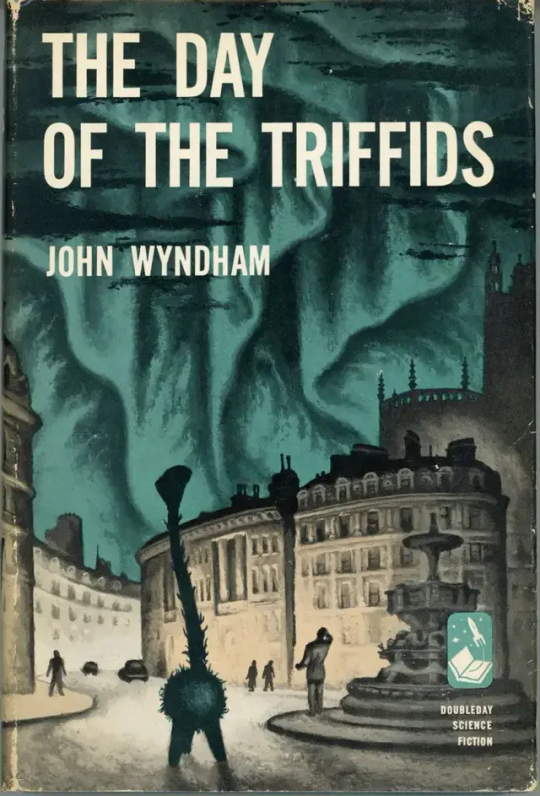
The Day of the Triffids by John Wyndham
Classic post-WWII dystopian sci-fi that focuses on society collapsing after a series of catastrophes that were unintentional but very much caused by people, which leads to a lot of the population becoming blind. Thematically this work engages with the loss of identity that people, both abled and disabled, face in the process of survival and a dark look at what happens after societies break down. How this applies to Bucky is obvious, but part of the argument of this post-Endgame series is that it applies to Steve, too.
Also, there are huge mobile carnivorous plants.
Fun fact: the opening of this novel is said to have been the inspiration for 28 Days Later!
Still Left with the River (The Paradox of Motion)
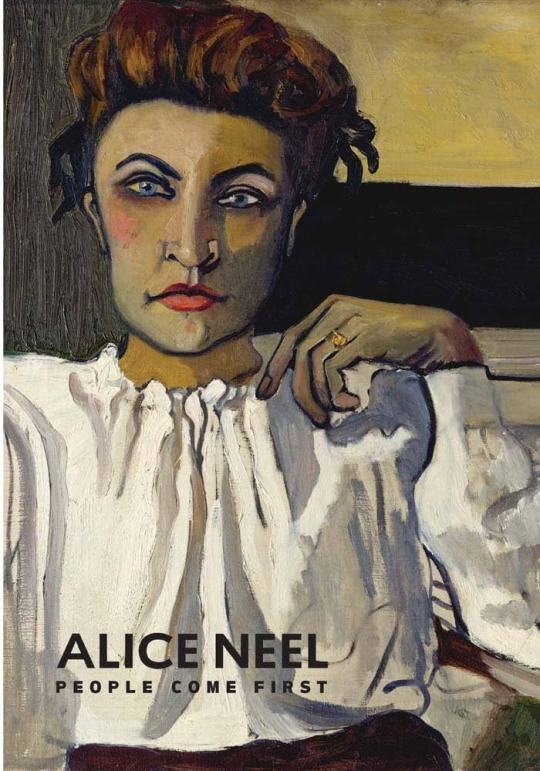
Alice Neel: People Come First by Kelly Baum and Randall Griffey
Alice Neel’s portraits are extraordinary, almost unnervingly vivid. In this story, Steve is familiar with her work as a fellow New York-based artist active in communist circles in the 1930s. She also worked for the WPA, producing wonderful street scenes that documented New York neighborhoods of the era.
To be honest, I have so many questions about what Steve was up to in the late 1930s before his war mania of the 40s hits.
One of the core themes of this series is Steve struggling with what his body is for if it’s no longer for violence. Who is he if he’s not a soldier? What is his radically changed body if it’s not a weapon? How do you come home from the war?
In this regard, Steve and Bucky have all kinds of shared life experience.
So thematically I include Neel because of her startling gift for capturing personalities and bodies through a process of frank, earnest, truthful observation of the integrated completeness of body and self: this space that’s you.
But a book of Alice Neel’s work with her sensitive portraits and fleshy frank nudes pulls him into flipping through page after page of these personalities and bodies, not idealized: seen.
Steve isn’t ready for that when he bumps into this big “impractical” art book in a holdover Barnes & Noble in Brooklyn, not when he’s still so shook up and adrift. But he will be.
There’s such empathy and radical humanism to her pieces. “People,” as she famously said, “come first.” I stand by the conclusion that Steve would love her work.
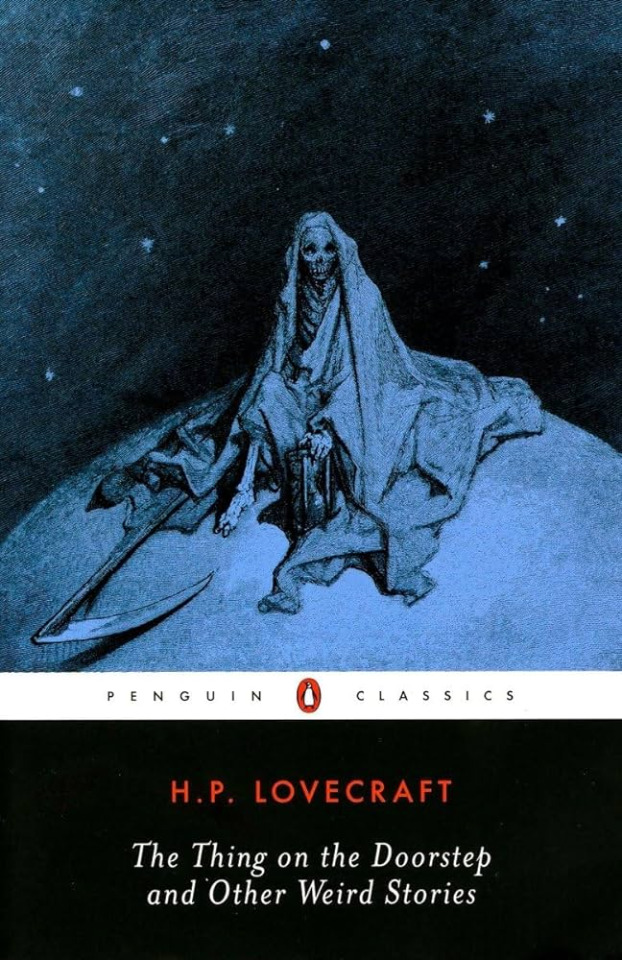
The Thing on the Doorstep and Other Weird Stories by H. P. Lovecraft
Lovecraft was relatively unknown in his lifetime—he died in 1937—but his stories were published in popular fantasy pulp magazines like Weird Tales and Astounding Stories, which is where Bucky would have come across his work. The fact that Steve recognizes Lovecraft by name means that teenage Bucky must have talked about what he was reading and the pulp stories he liked with teenage Steve, which is adorable—“this Lovecraft fellow, Steve, you wouldn’t believe the stuff he comes up with.” And Steve was paying attention enough to remember two decades and change later without the benefit of his serum-enhanced memory, which hurts my heart a little in the best possible way.
That’s how Steve all these years and decades later is able to wordlessly toss this collection of H. P. Lovecraft’s stories at Bucky on a hot hazy stumbled-upon beach in northern Florida and watch Bucky’s whole face light up.
And of course Bucky would view Lovecraft as a great beach read 😂
But this is the basis for something I’ve written into this series: Bucky excitedly sharing things he finds interesting with Steve—wanting to tell Steve first, Steve most. And although Steve is quiet, stoical and very self-contained, he’s paying a whole hell of a lot of attention.
Given that Bucky is canonically a Tolkien fan, I think the imaginativeness and ranging scope of Lovecraft’s complex, often interconnected stories would appeal to him. And, thematically, Lovecraft is distinctive for the era for having characters psychologically fragment when confronting these vast inhuman others.
“The Call of Cthulhu” opens with:
The most merciful thing in the world, I think, is the inability of the human mind to correlate all its contents. We live on a placid island of ignorance in the midst of black seas of infinity, and it was not meant that we should voyage far.
Steve and Bucky have each voyaged out a long way.
Trauma, in a way, is a form of terrible knowledge. You can heal but you can’t unknow things.
Not Language but a Map (The Grammar of Sensation)
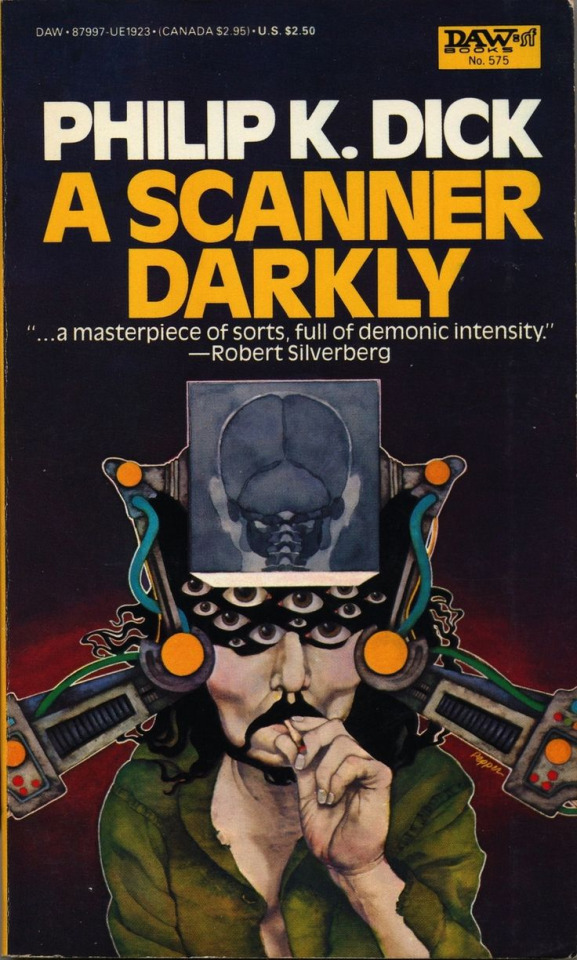
A Scanner Darkly by Philip K. Dick
This is the first book in the series that we see Bucky pick for himself. And, wow, he picks a doozy with themes of multiple and unstable identities, invasive surveillance, manipulation, psychosis, and how individuals can get chewed up by larger systems, falling through the cracks of society. Dick was writing based on his own troubled experiences with southern California drug culture of the early 70s, but this work gets at much more fundamental darknesses that I think would speak to some of the horrors Bucky has gone through and won’t talk about, not even with Steve.
Within the first few pages, we get this:
It was midday, in June of 1994. In California, in a tract area of cheap but durable plastic houses, long ago vacated by the straights. Jerry had at an earlier date sprayed metal paint over all the windows, though, to keep out the light; the illumination for the room came from a pole lamp into which he had screwed nothing but spot lamps, which shone day and night, so as to abolish time for him and his friends. He liked that; he liked to get rid of time. By doing that he could concentrate on important things without interruption.
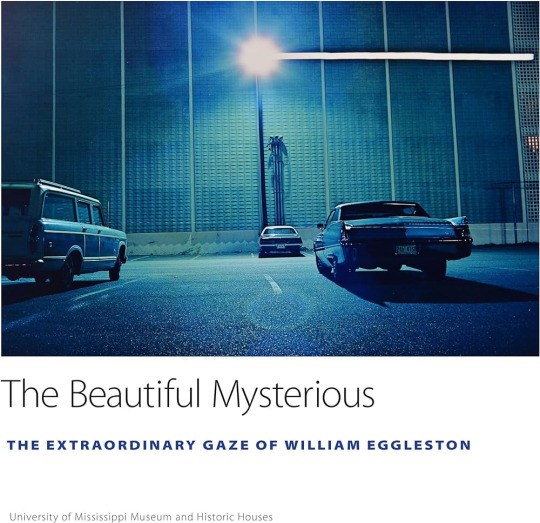
The Beautiful Mysterious: The Extraordinary Gaze of William Eggleston, edited by Ann J. Abadie
Eggleston was an early pioneer in color photography and that fascination with color is very apparent in his work. I think this focus would grab Steve as an artist who doesn’t take seeing the full spectrum of color for granted. Even in the MCU’s thin action-film scripts, Steve comments on things that offend his aesthetic sensibilities even when that has absolutely no bearing on the situation at hand, from Stark Tower to Lang’s van.
Not even a world-ending crisis can keep Steve from going, wow, no, that’s ugly. I enjoyed running with that 😂
Steve’s view of Eggleston’s photographs shifts over the course of the series, reflecting what he’s feeling, from the fragmented and disconnected detachment—“isolated and off-kilter”— that he sees in them at the beginning that shifts to the passionate engagement in the world he finds in them later.
Steve looks through the whole book of William Eggleston’s photographs again and at first the colors still roll over him like the shockwave of a distant explosion, all he can focus on. But gradually the subjects and compositions pull forward, too: monumentalized images of the everyday that at first seem neutral, the work of a detached observer. But the off-center framing of ordinary life is so deliberate as though everything might be important and where every detail deserves attention—that’s nothing like neutral. That’s not detached at all. You have to care a whole hell of a lot.
This mirrors the journey this post-Endgame Steve goes on. Because Steve Rogers should be a character who cares a whole hell of a lot, not what the MCU writers eventually reduced him to. And that’s what this fix-it is trying to fix.
Lost Vocabularies that Might Express (The Memory of These Broken Impressions)
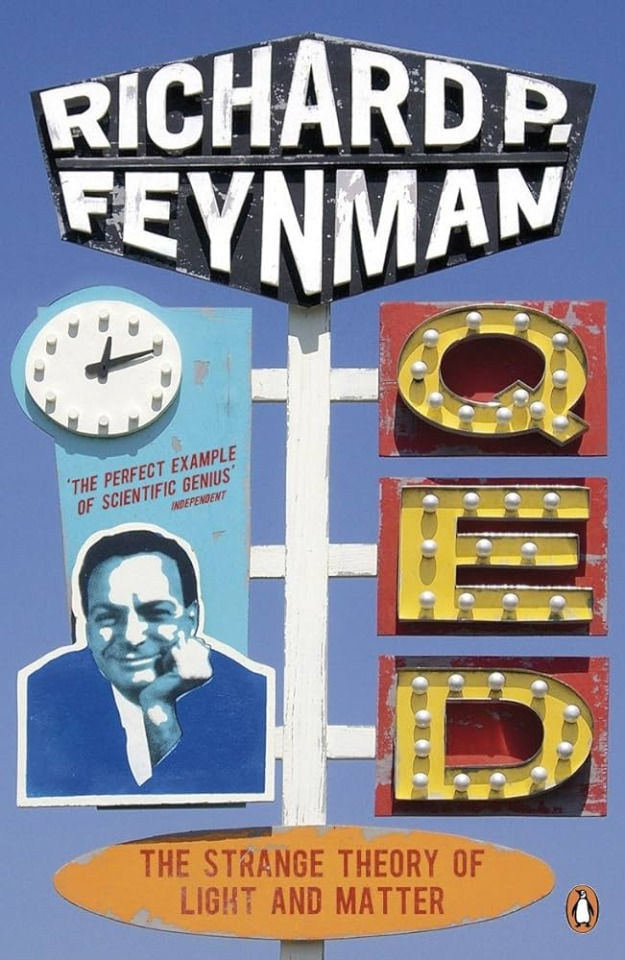
QED: The Strange Theory of Light and Matter by Richard Feynman
I love writing Bucky as a big fucking science nerd. His last night in New York and how does he want to spend the time? At a science fair with his best friend and a couple of pretty girls. So Bucky reading about quantum electrodynamics is delightful to me. The thing is, though, Bucky is a bright enough guy with a high school education. He’s not a genius—and the MCU is lousy with geniuses. But if Bucky wanted to learn a little more about all this quantum stuff he heard about in passing during some vague and very improbable sounding explanations, which by the way also allowed one of the few people still living who truly matters to him and the closest thing Bucky had left to family to fuck off to the past, well, Feynman’s QED isn’t a bad place to start in understanding some of this quantum stuff, at least.
Feynman here is very much writing for a popular audience. His writing is conversational—the book is adapted from a set of lectures he gave—and his voice is witty, casual and surprisingly light, but at the same time Feynman is deeply invested in helping lay people understand quantum mechanics. The book opens with:
Alix Mautner was very curious about physics and often asked me to explain things to her. I would do all right, just as I do with a group of students at Caltech that come to me for an hour on Thursdays, but eventually I’d fail at what is to me the most interesting part: We would always get hung up on the crazy ideas of quantum mechanics. I told her I couldn’t explain these ideas in an hour or an evening—it would take a long time—but I promised her that someday I’d prepare a set of lectures on the subject.
I prepared some lectures, and I went to New Zealand to try them out—because New Zealand is far enough away that if they weren’t successful, it would be all right! Well, the people in New Zealand thought they were okay, so I guess they’re okay—at least for New Zealand! So here are the lectures I really prepared for Alix, but unfortunately I can’t tell them to her directly, now.
C’mon! Tell me Bucky Barnes would not be hooked by this opening.
Thematically, and more seriously, the question of how could Steve do this? has two very different meanings. So far in this series Bucky isn’t ready to confront the harder version of that question which comes potentially with some very painful answers: how could Steve make that choice? Nope, he’s not ready for that. Instead, his brain unconsciously takes the easier way out: trying to understand quantum electrodynamics. 😂😭
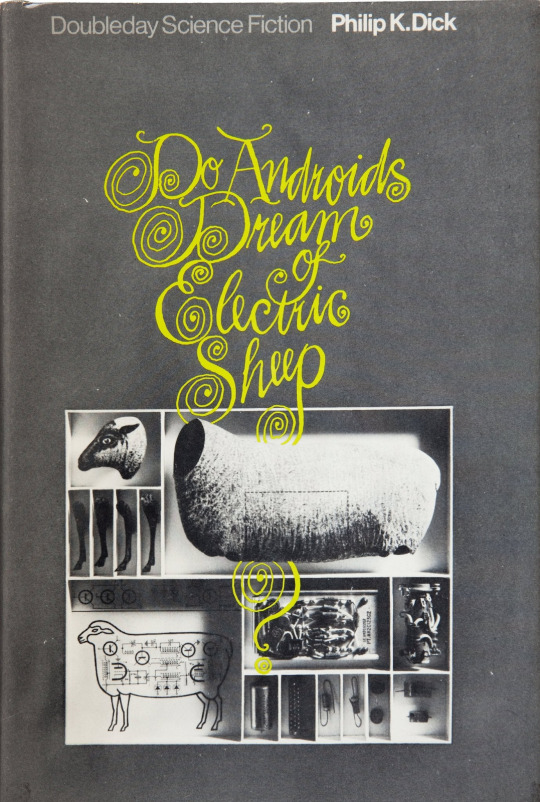
Do Androids Dream of Electric Sheep? by Philip K. Dick
Bucky must have liked A Scanner Darkly, because he went for another Philip K. Dick novel. Today remembered mostly as the source material for Blade Runner, this bleak dystopian novel is set in the aftermath of a devastating nuclear war that destroys most life on Earth. The work has themes around empathy—who feels empathy and for what?—materialism and what really makes us human.
I find it interesting how Sebastian Stan talks about The Winter Soldier in terms of someone who has undergone a process of total desensitization, which to varying degrees is deliberately part of the training of all soldiers. But rebuilding his core sense of empathy was one of the things Bucky chose to do as soon as he had any agency in that two-year period where he was on the run, which is remarkable. As a person who has been treated as though he wasn’t human and had his empathy forcibly stripped from him, I think Bucky would have a lot of complicated feelings about the enslaved androids who escape but are ruthlessly tracked down and killed. Some of these escaped androids are dangerous and do lack basic empathy—shown in the book by torturing and mutilating an animal—while other androids seem like ordinary people just trying to live their lives.
I like that Bucky talks about the book with Steve later in the story, returning in my view to a very old habit of bookworm Bucky wanting to share what he’d been reading with Steve <333
“I need to find something to read next,” Bucky says after wrapping up his description of an imagined religion that involved plugging into a box to virtually suffer the existence of a man forever walking up a steep hill while struck by crashing stones.
“Well, did the androids dream of electric sheep?” Steve asks.
“Who knows?” Bucky knocks into him gently as he takes the bowl Steve passes over. “They just wanted to be free. Though the free people just wanted to own stuff or plug into a box and suffer. So, you know, sort of a grim outlook. ”
“A little light, cheerful reading.”
“Hey, we live in a world where people write ‘Take back what’s yours’ in the streets and then smash up the windows. Dystopias don’t seem so far off the mark.”
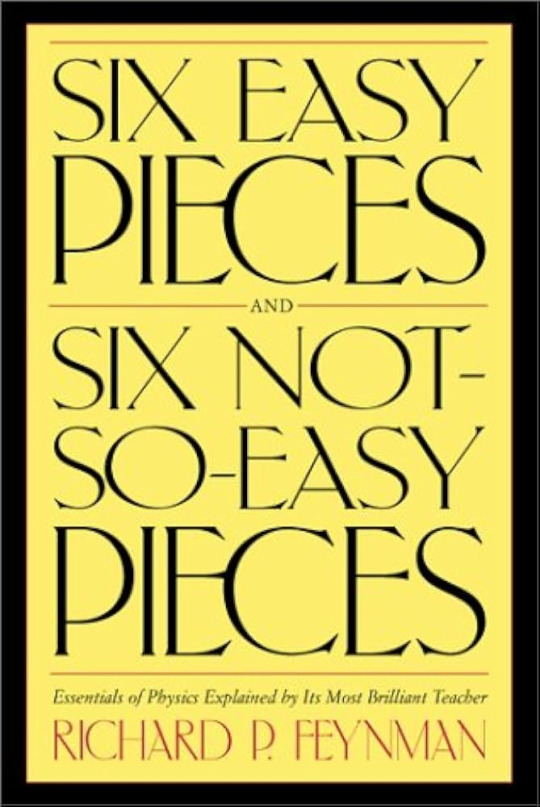
Six Not-So-Easy Pieces: Einstein's Relativity, Symmetry, and Space-Time by Richard Feynman
Another case of Bucky sticking with an author he likes! To me, this implies that Bucky has already read Feynman’s Six Easy Pieces, which explains some of the foundational basics of physics for a very broad and non-technical audience. Six Not-So-Easy Pieces is also drawn from Feynman’s famous Lectures on Physics, focusing here on relativity and space-time, but this work assumes a greater knowledge of math, hence the name. But as a legendary sniper Bucky must have a strong aptitude for math and anyway I just leaned into making Bucky an all-around nerd, because Bucky Barnes, nerd who grew up hot, is delightful to me.
Relativity, Symmetry, and Space-Time are all on point for a post-Endgame fix-it, which I think should count as a not-so-easy piece in its own right.
Throughout the series, we see Bucky using physical copies when he reads fiction, more or less from unconscious nostalgia: connecting back to memories of his younger self who was an avid reader of pulp magazines and cheap paperbacks. Once Steve gets him going with that first quietly tossed-over gift, Bucky always carries around a sci-fi or fantasy book in this series despite the limited space in his backpack. And this familiarity wouldn’t just be from his pre-war life since I figure Bucky would have gone for the Armed Services Editions that were distributed for free to soldiers. Bucky likely traded with other soldiers once he finished a book if he couldn’t get a new ASE distribution: trading in his finished novel for a new one is Bucky unconsciously falling back into another old habit.
But for non-fiction, Bucky is absolutely here for the Modern Marvel of being able to carry around as many books as he likes on his phone. I figure Bucky would have used public libraries during certain stages of his recovery when he was homeless and migratory since they are a place to get information that is consistently available in cities; and a warm, quiet place you can go with a minimal number of security cameras. I headcanon a middle-aged librarian who has a few streaks of gray in her dark hair—and who reminds Bucky of someone but he has no idea who—explaining what e-books are to this tall, gaunt, soft-spoken homeless guy with an eye contact problem. And this person who isn’t the Asset anymore and isn’t Bucky Barnes yet has the out-of-nowhere thought: huh, whaddaya know. That’s pretty neat.
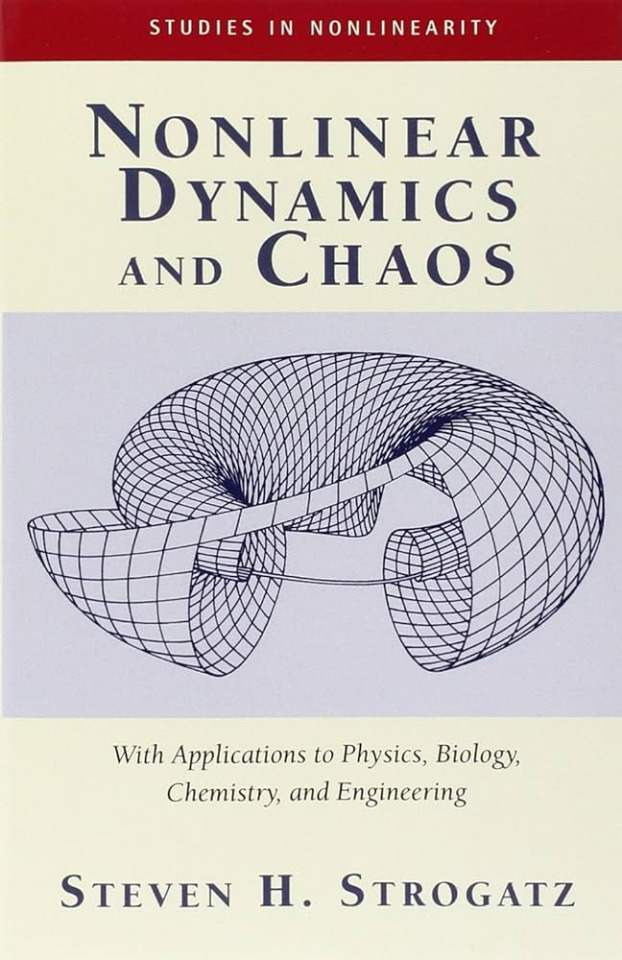
Nonlinear Dynamics And Chaos: With Applications To Physics, Biology, Chemistry, And Engineering by Steven H. Strogatz
Isolated systems tend to evolve towards a single equilibrium and these equilibrium points have been the focus of many-body research for centuries. But life is generally not that simple because most systems aren’t isolated. Often the dynamics of a system result from the product of multiple different interacting forces and objects in these systems can change between multiple different attractor wells over time. Or as Strogatz puts it:
As we’ve mentioned earlier, most nonlinear systems are impossible to solve analytically. Why are nonlinear systems so much harder to analyze than linear ones? The essential difference is that linear systems can be broken down into parts. Then each part can be solved separately and finally recombined to get the answer. This idea allows a fantastic simplification of complex problems, and underlies such methods as normal modes, Laplace transforms, superposition arguments, and Fourier analysis. In this sense, a linear system is precisely equal to the sum of its parts.
But many things in nature don’t act this way. Whenever parts of a system interfere, or cooperate, or compete, there are nonlinear interactions going on. Most of everyday life is nonlinear, and the principle of superposition fails spectacularly.
You can think of nonlinear dynamics as situations in which the sum of the parts is insufficient to understand the whole. This connects to multiple themes in this story as Bucky and Steve try to understand themselves, their lives and each other. But here Bucky is also just continuing to live his best life as a nerd with a strong intuitive knack for math, a high school education, an internet connection and a growing collection of science e-books. Or as Bucky puts it:
“It’s nice, though, like this smart guy is just talking to you but doesn’t assume you’re dumb because of what you don’t know.”
It’s touched on only very lightly in the series so far, but Bucky has a lot of complex feelings about higher education that relate to class, indirectly to sexuality, and go back to the experience of being the son of upwardly mobile working-class immigrants who were very bought-in on a traditional take on the American Dream.
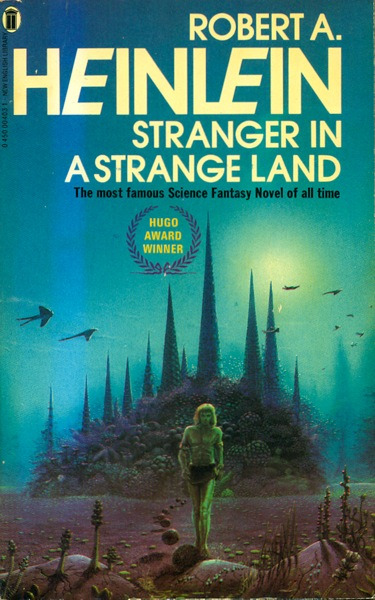
Stranger in a Strange Land by Robert A. Heinlein
I picked this partly because I thought the title would grab Bucky, who has been a stranger in a strange land several times over. Thematically this midcentury sci-fi novel focuses on challenging social norms through having the main character, a human who’d been raised by Martians on Mars, come back to Earth as an adult. A best-seller in its day that was controversial for its rejection of Christianity, monogamy and the nuclear family, the work is very tied to the looming cultural changes of the 60s and 70s.
The novel’s critical reputation has been steadily in decline for decades, but I think Bucky would find it interesting since he grew up within the traditional early 20th-century culture this novel satirizes and challenges—mores that this story’s version of Bucky didn’t unquestioningly accept but didn’t openly challenge, either.
Having Bucky pick this novel reflects the themes for the last act of this story that focus more on Steve and Bucky's different experiences as closeted queer men growing up in a deeply homophobic society. These experiences continue to shape and impact them and yet are also a past these two are coming to terms with and growing beyond.
Fun fact: this novel coined the word “grok.”
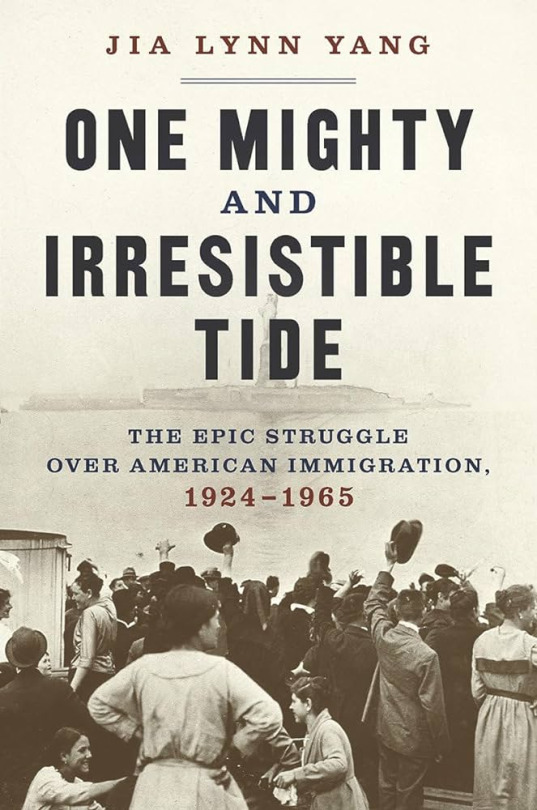
One Mighty and Irresistible Tide: The Epic Struggle Over American Immigration, 1924-1965 by Jia Lynn Yang
Of all the books featured in this series, One Mighty and Irresistible Tide is my top recommendation. This is an accessible, well-written history of a topic that haunts American history: immigration. The specific focus is the waves of legislation passed in the first half of the 20th century that tried—and often succeeded—in limiting who could legally immigrate based on the racial and ethnic hierarchies that equally haunt American history, right down to the foundation.
In this series, I wanted to pick up the themes of social justice and immigration that were so vaguely and incoherently included in TFATWS. These themes are inherent in the Snap and Return plotline except that Disney does not want to touch any of these politics with a ten-foot pole. But I remain fascinated by trying to wrap my mind around what it would mean for half the population to vanish and then return five years later, catastrophically in both cases. It’s a huge, intricate, sticky, difficult world-building problem that’s inescapably political.
Steve isn’t quite ready to dive into facing or helping to fix the problems of the post-Return world that his actions helped to create. But here we get to see Steve’s burned-out passion and conviction slowly rekindle as he reads about the complicated and often ugly history of American immigration—and he gets mad about it. Of course, he gets mad about it! This is my answer to the ludicrous idea that Steve Rogers could quietly sit out the second half of the twentieth century.
At the same time, I can have compassion for Steve knowing he can’t keep going but not knowing how to help himself, only to be given the cursed monkey’s paw of time travel. And he fucks up. His actions have real and lasting consequences. But that doesn’t make the situation hopeless or mean Steve can’t try to repair the relationships he damaged or work to regain the trust he lost, assuming he’s lucky enough to be given another chance by people who love him but have been hurt by his choices.
One of the greatest challenges in writing this Endgame fix-it was accepting Endgame as the starting point of the story and trying to reconcile a character I love with the choices canon has him make. Over the course of these stories, the central point isn’t Steve coming back to Bucky. It’s Steve coming back to himself. Through a slow and painful struggle, Steve finds himself again—rediscovering his stubborn endurance, his compassion for others and his drive to set wrongs right. Steve stumbled, badly, but he gets back up. Because that’s who Steve Rogers is.
And because of who Bucky Barnes is—his innate kindness, his warm-hearted generosity and his stubborn loyalty that isn’t blind but runs deep—that’s how these two characters come back to each other, after everything.
Deliberately, this series is the first hard-fought and hopeful glimmer in a long trudging process that can get so heavy to carry forward, day after day, but is shot through with moments of beauty and joy all the same.
I can't go on; I'll go on.
In other words, to quote one of my favorite poets: what the living do.
#thanks for the ask!#and the lovely comment#<333#book recommendations#stucky#stucky meta#lost vocabularies that might express#otp: till the end of the line#otp: even when i had nothing i had you#the existential loneliness of steven g. rogers#bucky barnes needs a hug#steve rogers also needs a hug#steve makes better choices#he's trying folks#all of my stories end up including a bunch of art and history#and I'm okay with that
19 notes
·
View notes
Note
Ralsei: *some real fucked up shit about their nature as darkners*
Lancer: "I'm 8 years old"
Ralsei: "emotionally yes, physically you're just as old as your fountain ^_^"
Lancer: "what?"
Ralsei: "what?"
(Idk if you subscribe to the Last Thursday theory about darkners, tho I don't think it changes how real they are, nor do I think it makes them lesser than the lightners since I think the Last Thursday theory can be applied to the light world too)
i get what you're going for, but i don't subscribe to the "last thursday" theory at all! the way i see it is this – the dark worlds have existed for a long time on a lower plane of existence, influenced by the lightners interfacing with them through their object forms. a dark fountain "creates" an instance of that world shaped by the knight's will where the lightners can interface with the darkners and the dark world itself face-to-face. (think of it like how although the game we call the light world is influenced by us interfacing with it as a video game, we cannot talk to kris or susie face-to-face or interact with the light world the way we would the places and people in our world. we'd need some kind of magical power to do that.) this is why we have things like the spamton q&a taking place before the knight arrived, darkners knowing about other darkners from future dark worlds (ie; jevil referencing queen, spamton&seam referencing darkners from ch3), and both the characters in the game and toby fox explaining that the dark fountains change darkners' behavior. those worlds have always existed and there is currently more indication in-game for that than there is against it.
that said, i do think being around ralsei (and being friends with the lancer fan club in general) is almost certain to drop some sort of light world (or even our world) knowledge on lancer. his and susie's shared arc involves questioning the status quo of closing fountains and destroying dark worlds (and i imagine the weird inconsistencies in the roaring story, too, judging by how lancer'll likely keep turning to stone the more he comes along on adventures), and so i'm sure both of them will butt heads with ralsei when fate and the power it has comes to take the trio (and kris, too, of course) all to task. themes!
#ooc#lancer#ralsei#deltarune#i do apologize for being “actually i don't really do this theory!” all the time i am just someone with a very different reading orz
12 notes
·
View notes
Note
About your angst vs lighthearted games question.
So, I don't think this question truly applies to me. Well, not in the sense that I could give you a clear preference.
First things first, I will avoid both extremes. I despise purely comedic stories and what not, so if it's something like that (imagine a sitcom like scenario), I will just skip it. But I also find totally unappealing a game that is 100% bleak and where it seems clear there's 0 chance for a good ending. My reasoning is that a game without stakes is bland and a game without "reward" (aka good ending) isn't worth my time. I think a good game has both angsty and sweet and/or funny moments, but ultimately the player CAN obtain what can be considered a good ending out of it. Otherwise, why put the effort, you know? So any game I play, it means I'm under the assumption good endings are possible, even if the path there is very angsty or even hard to achieve.
Now, I do love drama, but I basically like a story that has balance. If it's only angst, I will get bored. If it's too positive, I will get bored too. I'm a sucker for hurt-comfort, so it tracks.
To give more context to my opinions, it basically all relates to interactive vs non-interactive media. In non-interactive media like movies or books, you just have to watch or read the piece of fiction you're "witnessing it", and that's it. You don't have to "actively" DO anything. Since you're not putting in any "actual effort", you don't need a "proper reward". It sounds weird said like that, but basically, because of that, I accept that sometimes a piece of non-interactive media has a bad ending or that it's fully lighthearted without stakes because, you know, I'm just there watching or reading it and I don't have to "fight for it". But with interactive media, the player puts in real effort. It doesn't matter if it's a classic RPG where you have to literally fight, explore the world and what not, or a text based game like IF and VNs where you have to make the right choices and think about your decisions. At the end of the day, you are fighting for a reward and facing the consequences of YOUR actions. And so, if I decide to do that, I need a reward at the end of the journey. Some people will say that there's catharsis in a bad ending sometimes, but I personally don't experience that. I didn't hate all bad/sad endings to pieces of fiction I witnessed, but every single bad/sad ending just left me frustrated and was the opposite of cathartic, even if it wasn't always hated per se. It was always a "not bad as a whole, but the ending was mediocre". Only exceptions are "objectively bad" endings that to me feel "subjectively good" for a reason or another, but this is too much of a case by case thing.
So yeah, all in all, I most like balance of angst and lightheartedness.
Honestly, my main criteria to decide I will play an IF are: 1 - that the game contains romance (this is not a must in other types of games, but I play IF for that specifically). 2 - that the game allows me to have a male MC. 3 - that the game doesn't have random aspects, and if it has random elements, then it has to allow saves or have checkpoints (I'm a "one canon playthrough kind of player, so I need to be able to easily recreate the same results on each playthrough, meaning if random elements are into play, I need to be able to save scum easily).
As long as these two conditions are fulfilled, I can be interested in the game. Well, obviously, some kinds of plots won't appeal to me, but most of the time it can work at least in theory.
Sorry for rambling! It's an interesting question that ties in with a lot of thoughts I have about fiction as a whole!
I’m kind of like you tbh
I don’t mind bad endings in IF but I don’t want that to be the only type of ending but I do LOVE bad endings or sad endings in other media forms
For WWC the endings I have in mind go from bittersweet to really bad. I can’t add a completely happy Disney ending cause it doesn’t fit the tone. But like the bittersweet will be 70% happy
I also only play games which allow romance and not just any romance I need it well written I’ve played IFs where the plot and writing is superb but then the romance feels flat, like it was added last minute and to fit a quota. And I see this when they do the tell and not show of romance cause like give me DETAILS.
Which is also something I don’t do in stuff like books (I gravitate towards those that have little to no romance) and in movies I like the ones where the couple don’t end up together
I also don’t play gender locked games 😭😭 and it’s for 2 reasons 1) so much of the media I’ve consumed has been about men and at this point in my life I just make an effort to go to things that have women in important roles or allow me to play as a woman 2) I like gender to be commented on in game and I just find that looking through the eyes of a woman is much more interesting (again this is my opinion)
I’m also a one playthrough person and the only things I change are romances. I do dislike that save mechanism on like Hosted Games and CoG are at the writers discretion cause I hate having to start over cause I fucked something
17 notes
·
View notes
Text

ranting abt being kanade yoisaki.... if ur uncomfy with doubles, scroll away !!!!!!!1
raghhhhh i need white hair and my hair needs 2 be straight n long...... sighs. i already have blue eyes n im already extremely pale so thumbs up but ugh. i shld be skinnier too and that is related :|
i cant tell if im fickin or not but i rlly do wish i looked like. me? ive even always ACTED like me. im just. Kanade Yoisaki. this is the one "just like me fr.." character that's been CONSISTENT.
i was watching a video essay my meowtual Vriska made and SIGHS yeah. its >here< btw pls watch it. very good art and a very cool survey !!
^ but in relation to that I had a mini realization sorta. if i am a kanade fictionkin then i AM just Kanade. there would be no seperation between me and Kanade Yoisaki. if i AM fictionkind then I wouldn't be a "kanade kinnie" id BE kanade. just like how Vriska's whole video is about how fickind tend to suppress their identity to be more palatable. its just so hard to figure out if i AM fickindddd :|
and even then i dont feel like id be exactly like 'canon' me. id be different. id have several traits and such that i always have said I 'headcanon' Kanade with. maybe thats just me bein a bit Sillymode but urghfghg.
im just like i am in the game. i dont go outside regularly because the sun hurts my eyes, bright lights in general suck (though this may just be because my eyes are a lighter color- qwant it its weird), im very serious about music and i do believe it CAN save people, im not very good at personal hygiene and yet inexplicably im considered ~generally~ attractive by, at the very least, my parents. I've mentioned all that before, though. Plus preferring online school.
another thing i want to say bc i feel like it. everytime i see anyone else who's also a character i Am (ex, someone else who's Kanade) i dont ever get bothered. bc my brain rationalizes it through 'multiverse theory.' TL;DR 'doubles' dont bother me because i believe in infinite alternate realities and that if someone else is also kanade then they're just a kanade from an alternate reality. does that make sense?
i still feel a disconnect between the kanade in prosekai and myself- the kanade i am. enough to where i can refer to her in the 3rd person comfortably. im not the same as her. there's differences, I can feel them. ill just refer to Kanade in the game as 'canon!kana'/'canon!me' because that's easiest;
the biggest difference between us is that, well, canon!me is human. she also isn't explicitly trans in any direction, and is also a hard worker. all of that is stuff that doesnt apply. im trans- im queer in every sense of the word. every inch of my identity is a little weird, a little 'out of the norm.' No part of me can be easily described to a lot of people. I do know, thankfully, that people in the real world can be accepting. My Nana supports xenogenders and she's in her early 70s. Granted, I am her main source of information on neurodivergency and queer identity, but I'm able to unbiasedly explain terms and gently guide her in the right direction. I would feel safe in admitting I am not human, and do not like physically being so. I'm lazy- admittedly due to depressive symptoms, but I do not like work. I generally just hate having to do physical activity- even just in-general work. The reason I'm almost-failing all of my classes in highschool is because I hate working for more than a few minutes at a time, especially consecutively.
Of course, I will say I am not a person who really experiences delusions. That isn't to say those who do are lesser or that I'm better- it's just a simple fact. I specify that because this is the 'piss on the poor' website. I can seperate my physical body right now as I physically am from my possible fictionkinnity- at this current moment I am (at the very least biologically) not a shapeshifter like I often call myself. I am human, I am biologically a perisex female, etc. I don't like to see myself like that. I am Uta, yes. But Uta isn't a human. Uta is Kanade Yoisaki. Uta is a shapeshifter. In some way or another, I am nonhuman- or otherwise 'different.' I always have been.
idk. im just kanade. i dont properly know what i mean by it, other than. well. I Am Kanade. and that's really all there is to it.lon

#shut up uta!#(not) uta; KANADE YOISAKI#ty my awesome meowtual vriska for making that video essay it haha#it sure opened my eyes or something#vent post#<- ? not rlly#fictkin#fictionkin#alterhuman#nonhuman#long post#fictionkind#fictionkin community#fictionfolk#kin stuff#alterbeing#fiction kin#speciesqueer#<- for the attention i love so much#(also im def not human)
9 notes
·
View notes